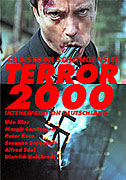
Regie:
Christoph SchlingensiefKamera:
Reinhard KöcherMusik:
Kambiz GiahiBesetzung:
Udo Kier, Margit Carstensen, Peter Kern, Christoph Schlingensief, Dietrich Kuhlbrodt, Eva-Maria Kurz, Susanne Bredehöft, Wolfgang Grönebaum (mehr)Inhalte(1)
Die beiden Ex-Gangster Bössler und Jablo haben in der ostdeutschen Kleinstadt Rassau eine neue Heimat gefunden – der eine besitzt ein Möbelgeschäft, der andere eine kleine Kirche. Hier setzen sie zur Säuberung der Stadt von Ausländern an und leiten Angriffe auf ein Asylantenheim. Erst zögerlich nimmt das Bundeskriminalamt in Gestalt von zwei trägen Beamten die Arbeit auf. Das Prekäre: Die Fronten verwischen sich mehr und mehr, alle geraten in einen sexualisierten Rausch der Gewalt und obszönen Bilder. Die Medien spielen in dieser Trash-Fantasie auf fatale Weise mit und heizen die perverse Stimmung an. (arte)
(mehr)Kritiken (1)
At first glance, Schlingensief’s typically hyper-exalted circus act may seem like pure madness. But thanks to the fact that it abandons the traditional style and norms of the mainstream and revels in the cartoonishly exaggerated, carnivalesque bustle of the underground, it can focus on a range of phenomena from the end of the millennium. Actually, we can even say that thanks to the style described above, in Terror 2000 he achieved the format of anarchist hypertext, which can encompass in one frantic mishmash not only migration, the rebirth of the Nazis and the bureaucratic apparatus, but also the full range of emotions elicited by the media image of contemporary reality. The film’s central storyline consists in sensationalist and hysterically distorted reporting, which completely abandons the realm of serious journalism and allows itself to be swept up in the mass hysteria that it provokes and feeds. The film does not present this directly through the literal inclusion of reporters, but primarily at the level of style and references. Specifically, the narrative frames the issues of the 1990s in a common storyline with the nationally watched Gladbeck bank robbery case in 1988. The final part of Schlingensief’s trilogy about Germany thus shows the reunified country as a cauldron of hatred, frustrations, obsessions, traumas, racism, violence, helplessness and politics. Schlingensief brings to the aseptically refined German cinema of the turn of the millennium the sorely missed stimulating physicality that characterised genre film production of the 1970s and, in particular, the parallel anti-wave that defined itself against the pretentious New German Cinema. Unlike distinctive filmmakers of the time such as Roland Klick and Klaus Lemke, Schlingensief – remaining true to the underground and alternative theatre – did not look to French or American cinema for style, but instead simply enjoyed exposing viewers to phantasmagorical puppet theatre packed with provocative stimuli. Actually, it’s almost amazing that, in these exalted and exceedingly volatile times, Schlingensief’s films still seem frantic and difficult to grasp. We can find the reasons for this in the way the current online hypermedia suppresses physicality, or rather only allows its refined and standardised form.
()